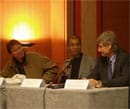The world of sports and studies converged at the end of the week to discuss the current possibilities of combining high-level sports practice with pursuing higher education studies. What was unfortunately quite rare just a few years ago seems today more accessible through the support of federations, associations, and schools that better guide the future choices of young athletes. For this purpose, three guests of honor with three very different experiences shared their paths, illustrating the journey still needed to offer the necessary assets to reconcile sports and studies.
“An elite athlete is a lonely man,” began Jean-Michel Bellot, diving straight into the subject by stating that “the only studies offered to me were in becoming a sports teacher.” His career path then veered “from journalist…covering the ‘crushed athletes’ beat,” to now evolving within the Lagardère Group. After flirting with the heights at the end of his pole vaulting pole, entering the workforce was not so simple, even if upon his arrival at Lagardère Group as the Director of Development, Jean-Michel Bellot, once again, cleared a bar without knocking it down.
For Stéphane Diagana who studied throughout his sports career, “sports were a pleasure, not a sacrifice.” After a stint at INSEP, he put his studies on hold to later join Sup de Co. “I regret the fact that when I told my professors I was leaving for a training camp, they would say… have a good vacation! However, sometimes it wasn’t much better on the federation’s side, where it’s not always seen favorably to pursue studies alongside a career.” The divide between sports and studies is also measured by such situations. “It’s a shame that there isn’t a university at INSEP,” states the mission head “Sports and Universities,” a role newly entrusted to Stéphane Diagana by Roselyne Bachelot and Bernard Laporte to think about the best ways to reconcile sports and academic curriculum.
For Jean-Claude Skrela, current National Technical Director of the French rugby federation, “studies stopped at the certificate of studies and then moved onto training in mechanics.” “When one has acquired more skills than knowledge, one goes seeking that knowledge,” he declares, sharing his experience as a rugby luminary who believes that “the educational world does not provide enough resources to athletes, whereas Anglo-Saxons have perfectly managed to integrate sports into the educational system. French sports would benefit significantly from developing education. However, athletes should also not be overly assisted and must learn to manage on their own.”
Thus, three perspectives on the integration of studies in sports and sports in studies from three generations show that, while the path to merging high-level sports and studies is now less fraught with obstacles, it remains sometimes quite challenging.
The site for Ceram Bachelors.


